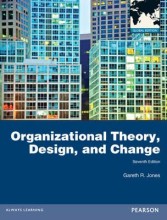Growing effective organizational cultures - STAKEHOLDERS, MANAGERS AND ETHICS
8 important questions on Growing effective organizational cultures - STAKEHOLDERS, MANAGERS AND ETHICS
There are two main groups of organizational stakeholders:
- Inside stakeholders
- Outside stakeholders
The chief executive officer
The CEO can influence organizational effectiveness/decision making in principal ways:
2. The CEO selects key executives to occupy the topmost levels of the managerial hierarchy.
3. The CEO determines top management’s rewards en incentives. 4. The CEO controls the allocation of scare resources such as money and decision-making power among the organization’s functional areas or business divisions.
5. The CEO’s actions and reputation have a major impact on inside and outside stakeholders’ views of the organization and affect the organization’s ability to attract resources form its environment.
- Higher grades + faster learning
- Never study anything twice
- 100% sure, 100% understanding
Top managers and organizational ethics
Ethics: Moral principles or beliefs about what is right or wrong.
Why do ethical rules develop?
- One of the most important reasons why ethical rules governing action develop is to slow down or tempter the pursuit of self-interest.
- Ethical laws and rules emerge to control self-interest behaviour by individuals and organizations that threatens society’s collective interests.
- Ethical rules reduce transaction costs between people, that is, the costs of monitoring, negotiating and enforcing agreements with other people.
Why does unethical behaviour occur?
- Self-interest
- Outside pressure
Supporting the interests of stakeholder groups
- Unethical behaviour makes a company a riskier investment.
The question on the page originate from the summary of the following study material:
- A unique study and practice tool
- Never study anything twice again
- Get the grades you hope for
- 100% sure, 100% understanding






























